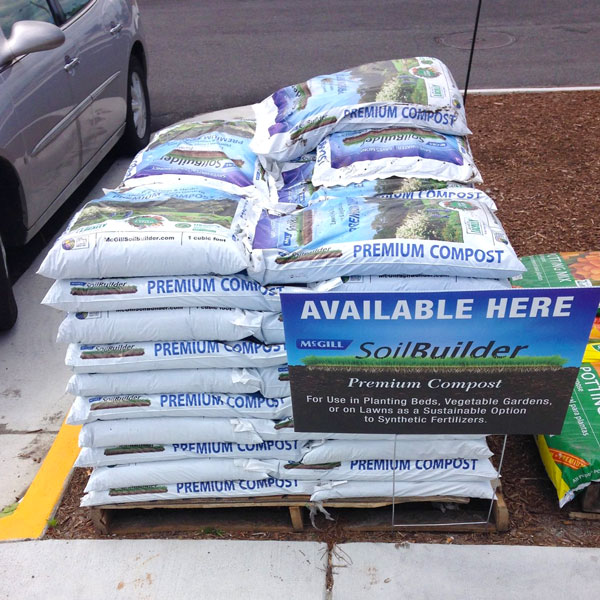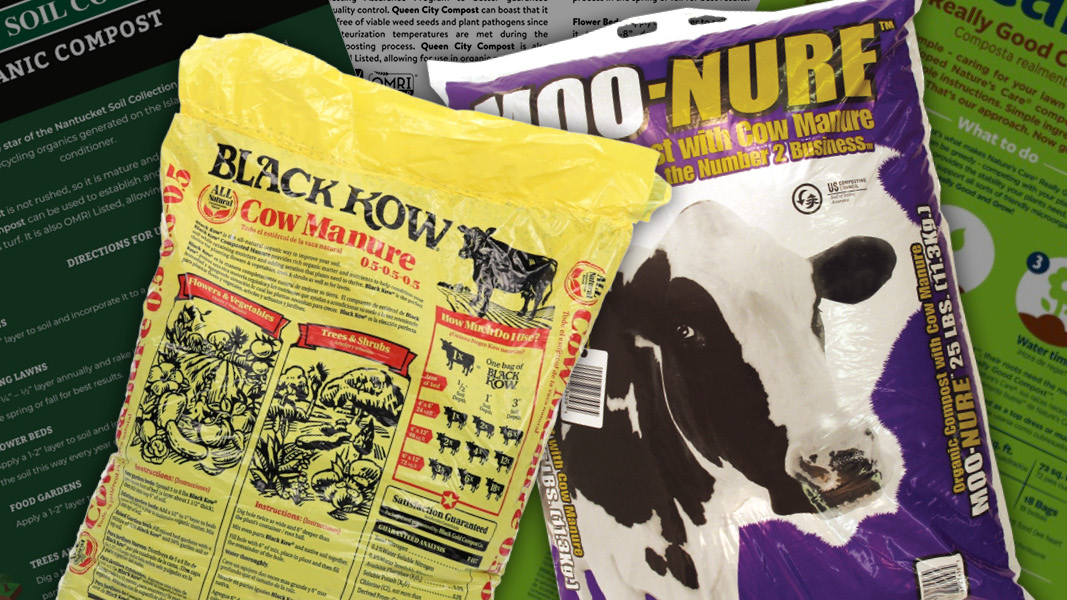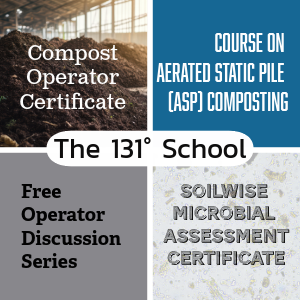Top: Data to be provided on a label includes the net weight or volume, product name, producer’s contact information, directions for usage, and a derivative statement (what’s in it). Images courtesy Ron Alexander
Ron Alexander
The “commercial” U.S. composting industry is almost 50 years old. It is present in all 50 states, and includes over 4,500 facilities. Compost, as a soil enhancement product, is now a staple of the landscaping and soil blending industries, and possesses a substantial market share in turf management, erosion control, stormwater management and agriculture. Compost is marketed in bulk and packaged form and is an ingredient in a multitude of packaged “soil” products.

McGill SoilBuilder, a STA-certified 100% compost, is sold in tractor-trailer load quantities from facilities (such as this garden center) in the mid-Atlantic and Southeast, and through authorized resellers. Photo courtesy Atlantic Garden Center
For over 25 years, a small number of composting industry representatives, strategically funded by the US Composting Council (USCC), have positively impacted compost labeling, registration and distribution requirements, as well as protected the industry from unscientific attacks from competing industries, as well as some misinformed but well-intentioned individuals. It must be mentioned that honest concern about the safety of compost products, typically related to their feedstocks (some of which contain pathogens and low levels of heavy metals and other chemical contaminants), as well as their efficacy, have come up from time to time. These concerns have been addressed with extensive research and scientific data. These efforts have occurred at semi-annual meetings of the American Association of Plant Food Control Officials (AAPFCO).
While the USCC, and its representatives, have worked to simplify compost labeling, registration and distribution requirements on a national basis, individual composters must better understand product distribution regulations in the states in which they market. As markets for compost products continue to expand, so does the number of products that it competes against in the marketplace. To make sure the playing field stays somewhat even, organizations such AAPFCO exist.
What Is AAPFCO?
AAPFCO is a voluntary organization of state Department of Agriculture (DOA), and related, officials. More specifically, it represents the ‘Control Officials’ who register and regulate the distribution of fertilizer, soil amendments and liming agents (and sometimes pesticides and animal feed) in each U.S. state, its territories, as well as Canada. The organization creates model bills and regulations to assist intrastate and interstate commerce of agricultural and horticultural products. Its primary goals pertain to consumer protection, by requiring “truth in labeling,” overall product safety, and uniform regulation from state to state.
AAPFCO model bills, regulations and Statements of Uniform Interpretation and Policy (SUIP) are created to provide guidance to states — they are not forced upon them. States can accept, reject or modify them. Related state regulations can be developed through legislation or by a state agency, and there are interpretable aspects to them. This is important to mention, as today the overall industry is in a transitional period, with many long-time Control Officials retiring or moving on to other positions. And with those transitions, regulations are being interpreted differently, causing chaos in some states. Further, large new initiatives are underway within AAPFCO. The most pertinent one is the replacement of the Uniform Soil Amendment Bill with the Uniform Beneficial Substances Bill.
New Uniform Beneficial Substances Bill
Creation of the Uniform Beneficial Substances Bill was deemed necessary to better regulate the sale of plant biostimulants and soil and plant inoculants (microorganisms), as well as more standard soil amendments, like compost. Another important goal is to more uniformly label these and mixtures of these products from state to state. Understand that the creation of this new Bill does not affect composters’ abilities to register their compost as a soil amendment (or alternatively, as a fertilizer, if nutrient claims are made). That stated, consider contacting Control Officials in states in which you market for relevant specifics.
 Possessing a good understanding of your state’s soil amendment regulations and knowing the state Control Official in each state you market in is also important because they determine what you can legally say about your “compost” (e.g., product benefits) on a product label and/or in promotional materials. Remember that in almost every state, a composter will be required to have a legal product label, which would be the package itself, if packaged, or a piece of literature which accompanies a bulk shipment. (Figure 1 illustrates the labeling requirements.) Further, since most states have a soil amendment law, registration and tonnage fees are likely to exist and must be paid.
Possessing a good understanding of your state’s soil amendment regulations and knowing the state Control Official in each state you market in is also important because they determine what you can legally say about your “compost” (e.g., product benefits) on a product label and/or in promotional materials. Remember that in almost every state, a composter will be required to have a legal product label, which would be the package itself, if packaged, or a piece of literature which accompanies a bulk shipment. (Figure 1 illustrates the labeling requirements.) Further, since most states have a soil amendment law, registration and tonnage fees are likely to exist and must be paid.
The new Uniform Beneficial Substances Bill includes the following key definitions:
Beneficial Substance: Any substance or compound, other than primary, secondary, and micro plant nutrients, and excluding pesticides, that can be demonstrated by scientific research to be beneficial to one or more species of plants, soil or media.
Plant Amendment: Any substance applied to plants or seeds which are intended to improve growth, yield, product quality, reproduction, flavor, or other favorable characteristics of plants except fertilizers, soil amendments, agricultural liming materials, animal and vegetable manure, pesticides, plant regulators, and other materials which may be exempt by regulation.
Plant Biostimulant: A substance(s), microorganism(s), or mixtures thereof, that, when applied to seeds, plants, the rhizosphere, soil or other growth media, act to support a plant’s natural nutrition processes independently of the biostimulant’s nutrient content. The plant biostimulant thereby improves nutrient availability, uptake, or use efficiency, tolerance to abiotic stress, and consequent growth, development, quality or yield.
Plant Inoculant: A product consisting of microorganisms to be applied to the plant or soil for the purpose of enhancing the availability or uptake of plant nutrients through the root system.
Soil Amendment: Any substance or a mixture of substances which is intended to improve the physical, chemical, biochemical, biological or other characteristic of the soil, except fertilizers, agricultural liming materials, unmanipulated animal manures, unmanipulated vegetable manures, pesticides and other materials exempt by regulation.
Soil Inoculant: A microbial product that is applied to colonize the soil to benefit the soil chemistry, biology, or structure.
Understanding Compost Registration And Labeling
As a refresher, here are some of the basics of compost registration and labeling. Of course, exceptions do exist so always refer back to regulations in the states in which you distribute (sell or giveaway).
Registration
- 48 states have fertilizer laws (Alaska and Hawaii do not) and 38 states have soil amendment laws. Therefore, you’ll typically have the option of registering compost as a soil amendment or a fertilizer. Some states may even require dual registration. The choice in registration will be dependent upon the product claims you make and how you choose to position your product in the marketplace. Almost all composts are registered as soil amendments.
- If you market your compost in a state with a fertilizer or soil amendment law, and you make related claims, then your product is supposed to be registered. If you make nutrient claims, then you register as a fertilizer. There are a few states that exempt compost from registration, but they are few and far between. Some states also allow a product to go unregistered, if no soil amending or fertilizer claims are made on its label or in other sales tools. The bottom line: if your state has a soil amendment law and you are making soil amending claims, then technically you need to be registered.
- Composted manure is often considered to be a fertilizer (while unmanipulated manures are unregulated).
- Both municipally generated composts and products that are given away (distributed and not sold) are not exempt from registration, unless specifically designated as such by a particular state.
- Fees associated with registering both soil amendments and fertilizers vary from state to state. There may be a registration fee per product or company, as well as tonnage fees (known as inspection fees). Product registration fees range from $0 to $200 per product and tonnage fees range from $0 to $1.00 per ton. However, most soil amendment tonnage fees are $0.50/ton or below and many are zero. Almost all states that charge fees, charge $125 or less.
Labeling
- AAPFCO Uniform Bills define the term “label” as the display of all written, printed, or graphic matter, upon the immediate container, or a statement accompanying a product. Today, state Control Officials consider a label to be any information written, including what is displayed on a composter’s website.
- Data to be provided on a label includes the net weight or volume; product name; producers contact information; directions for usage; and a derivative statement (what’s in it). If the product is registered as a fertilizer, then a guaranteed nutrient analysis is also required.
- Various compost claims can be made on compost labels, and they will be based on the states in which you market and what you register your product as (soil amendment or fertilizer).
- Unfortunately, lab analysis sheets (containing nutrient data) are considered to be labels, and therefore, the nutrient data contained in them are typically considered to be nutrient guarantees. Some states enforce this requirement more rigorously than others.
- Any reference to the term nutrients or fertilizer is not allowed unless the compost is registered as a fertilizer. Further, any written references to nutrient content could be deemed a claim or guarantee (which then would require registration as a fertilizer).
Learn More
A free 90-minute session regarding AAPFCO, product labeling and registration, and organic listing will be offered to attendees of the 2026 US Composting Council Conference in Sacramento, California.
Part II of this article will outline allowable compost labeling claims, as well discuss other labeling allowances and exceptions for compost products. Many of these were obtained through efforts of the US Composting Council.
Ron Alexander is President of R. Alexander Associates, Inc., Cary, NC, ron@alexassoc.net. R. Alexander Associates, Inc. specializes in product and market research, and development for organic recycled products. He has served as an Industry Liaison to AAPFCO, representing the U.S. Composting Council, for the past 25 years. For more information, go to: www.alexassoc.net and click on Library of Articles.













